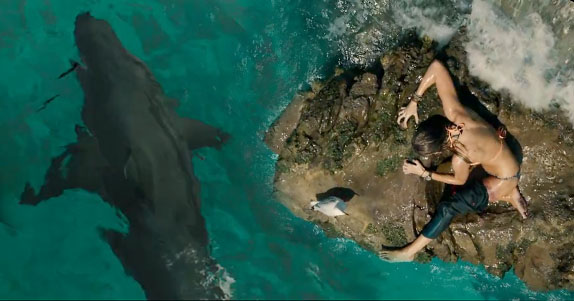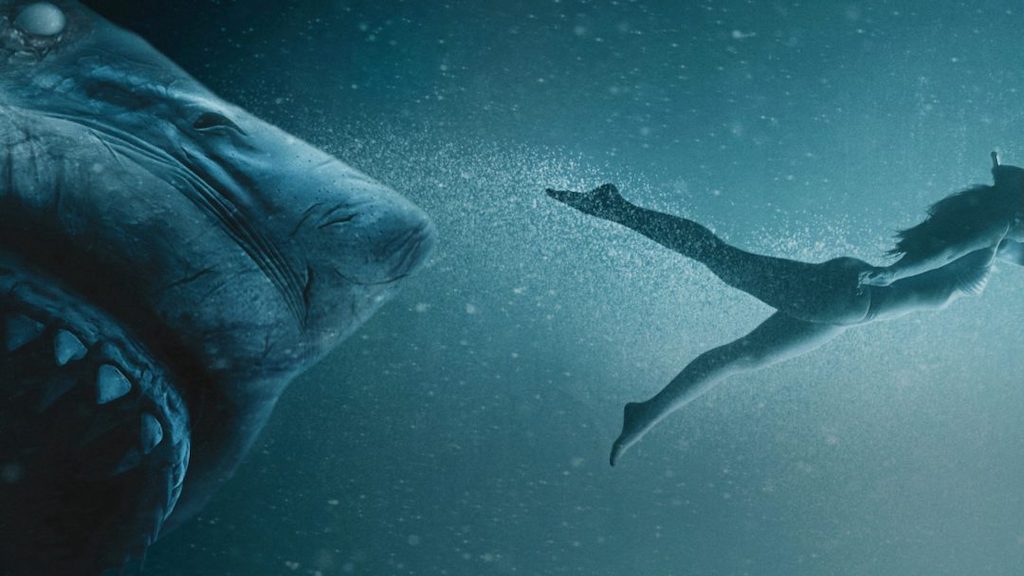The Sublime Silliness of Shark Horror Movies
Last month, my son Liam caught a shark. We were visiting my family in South Carolina, and my dad booked a family fishing charter in the Lowcountry’s marshy tidal rivers. Not long after anchoring near a muddy bank bleached with broken oyster shells, Liam’s fishing line went taut. With the help of the captain, he reeled and pulled, reeled and pulled, as the fish at the other end swam hard and fast. We all bent expectantly over the side, wondering what he’d hooked. After a few minutes of a tough fight, we finally saw it: the unmistakable gray blade of a shark’s fin.
It was a 3-foot bonnethead shark, a small species of hammerhead that feeds on stingrays, crabs, and other bottom dwellers. The captain held the shark gently while we took a few photos and stroked its prickly skin, and then he and my son returned it to the water. Its dorsal fin sliced the surface and then it vanished in the murky river. Even though the bonnethead was small and posed no threat to us, we couldn’t help but look at it with a certain fearful awe. Despite its size, we knew we were in the presence of a killer.
Sharks terrify and fascinate us because they’re so alien, and so very toothy. Anyone who’s gone swimming in the sea has experienced that tug of fear, like a sudden strong undertow, when we realize how vulnerable we truly are in the water; at any moment some huge, razor-toothed monster might rocket out of the unseen deep and tear us to pieces. Every other apex predator that occasionally preys on human beings (bears, wolves, big cats, crocodilians) is at least partly terrestrial. They inhabit the same environments we do—and they breathe air. Against them, we can quite literally stand our ground. But even Michael Phelps is sloth-like compared to the vast majority of marine creatures, and sharks are among the largest and fastest of them all. The sea is the shark’s kingdom, and we’re helpless trespassers in her watery domain, one that covers most of our planet. Little wonder, then, that sharks have so much documentary airtime dedicated to them, including the secular holiday Shark Week, and their own subgenre of horror movies and novels. Bears and lions pop up now and then as cinematic antagonists, but sharks feature in almost as many horror movies as serial killers. They’re stars.
After catching the bonnethead, Liam, like many kids and adults before him, developed a brief obsession with sharks, using his daily allotted screen time to watch YouTube clips and NatGeo documentaries about them. Then came movies. The other day, he asked to watch 47 Meters Down: Uncaged, the low budget sequel to the 2017 Mandy Moore thriller. I checked to make sure the film didn’t contain any sex scenes or human cruelty like torture, and then agreed to watch it with him. Scary stuff doesn’t phase him, so I knew he wouldn’t have nightmares (I, on the other hand…). The film is about four teen girls who scuba dive into the sunken ruins of a lost Mayan city in a remote Yucatan cenote. Little do they know that the lost city hosts a pair of great white sharks that have, like cave fish, grown blind and pale in the abyssal darkness. It’s basically The Descent, but wet.
If all that sounds ridiculous, it’s because it is. One reason I felt okay letting my 2nd-grade son watch the movie was precisely that you can usually count on horror movies with sharks to lean more heavily on silly spectacle than terror and gore. 47 Meters Down: Uncaged even has a moment that pays bloody homage to that greatest of all shark horror scenes: the moment in 1999’s Deep Blue Sea when, in the middle of a big inspirational speech, Samuel L. Jackson’s character is suddenly snatched up by a hyper-intelligent mako shark.

Of course, the shark horror genre didn’t begin in ridiculousness. 1975’s Jaws, the mother of both the subgenre and the summer blockbuster, is a genuinely tense and frightening film. That’s because Steven Spielberg is a great director, and he’s a great director because he understands that a shark movie has to be about something besides predatory fish eating people. Where Jurassic Park is about scientific hubris and the failure of complex systems in the face of nature, Jaws is about how a community reacts to threats and the loss of life. There’s a reason the movie’s mayor has reemerged as a meme in the age of Covid-19. His greedy denialism in the face of communal danger is the movie’s true villain, far more than the great white who is simply going about its natural business.
Jaws launched the subgenre and birthed a series of sequels, none of which amounted to anything of note other than providing Michael Caine with a nice house. But it’s Deep Blue Sea, with those hyper-intelligent makos, that is truly the ultimate shark movie, because it proved that a mix of genuine oceanic terror along with a winking sense of its own silliness was a winning formula. Take the premise: on paper, it seems like the same kind of scientific hubris plot as Jurassic Park. Scientists make makos hyper-intelligent in an attempt to cure Alzheimer’s; things go very wrong. But where you can’t deny the childlike wonder that comes with the idea of a cloned dinosaur zoo, there is, of course, no good reason to make apex predators into geniuses to cure Alzheimer’s. That is obviously a terrible idea, and the movie knows it. As with most shark movies, you end up rooting against your own species, because anyone who creates hyper-intelligent sharks is just asking to be devoured.
From Deep Blue Sea, it’s an easy descent to the Sharknado series and 2018’s The Meg (based on Steve Alten’s book series), where Jason Statham fights a giant, prehistoric shark. The genre still occasionally tries its hand at Jaws-style seriousness, with mixed results. 2003’s Open Water is visceral and terrifying, but the terror comes less from the circling sharks than the idea of being left adrift in the middle of the ocean. The sharks are simply the knife wielded by the real killer: the sea.
The original 47 Meters Down also tries to play it straight, but it’s marred by its very title. Anyone who’s strapped on a scuba tank can tell you that a movie about amateur divers, at 47 meters, being menaced by sharks, should last about as long as the divers’ air supply, which is to say, five minutes at most. Blake Lively’s 2016 movie The Shallows is probably the most successful post-Jaws attempt at serious shark terror, with its narrow focus on a lonely surfer menaced by a great white. But after a tense opening act, it eventually drifts into silliness, with a bird named Steven Seagull and a shark that goes from natural predator to fish-with-a-grudge by the end of the film.

The true fear that sharks evoke in us, that while out for a swim we might suddenly and randomly be preyed upon by a marine monster that sees us as nothing more than a morsel of meat, is hard to sustain over an entire movie. Real shark attacks last only a few minutes at most. So the movies have to give the sharks a reason to stick around and menace our heroes, rather than swimming off to find more suitable prey. Sometimes this takes the form of a tornado, or hyper-intelligent sharks, but in many cases it’s something frankly sillier: the idea that sharks might be out for vengeance (see, for example, 1987’s Jaws: The Revenge).
The shark horror genre thrives on ridiculousness because it has to. Sharks are, in reality, not much of a threat. If you are not currently in the ocean, then rest assured that the chances of you being eaten by a shark are functionally zero. Even if you are currently in the ocean (and if you are, why are you reading this?), all you need to do is swim to shore, or step onto even a modestly-sized boat or rock, and you’re out of danger. We may be highly vulnerable in the sharks’ domain, but they are completely useless in ours. The odds are stacked heavily in our favor. And that’s the real source of the absurdity of shark horror: we’re the predators, not them. Humans eat far, far more sharks every year than sharks eat humans. It’s like if wolves told story after story about being attacked by sheep (which maybe they do. Maybe when you hear a wolf howling at the moon, she’s recounting the plot of Sheepnado).
The ridiculousness of the shark horror subgenre is not only fun, it’s appropriate. Like any horror movie, shark flicks allow us to safely experience a very real fear, but in this case, they also acknowledge how remote and absurd this particular danger is for most of us. Still, the enduring popularity of the shark horror subgenre, and its nonfiction brethren like Shark Week, suggests that we have a bottomless appetite for stories about our finned friends. Like Liam’s bonnethead, no matter the size and shape of the shark, we’ll never fail to be drawn to these strange, sharp-toothed denizens of the deep, unforgiving sea.



